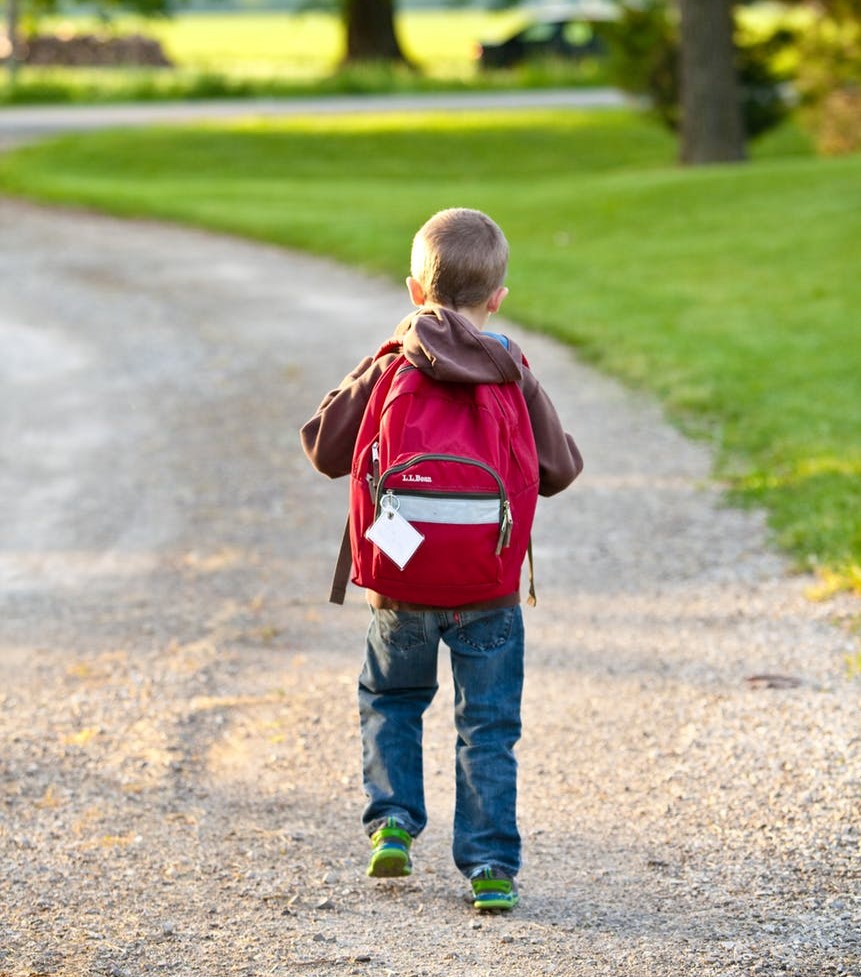Making mistakes and learning from them to grow stronger is the essence of life. Let your kids experience undesirable outcomes, mistakes and set-backs. They are the best lessons life has to offer. Expose them to small doses of discomfort and failure earlier in life and allow them to grow into bigger, better, stronger and most importantly independent, happier adults.
Isn’t it funny how humanity is wired: Babies don’t read a book or attend a classroom course to learn how to walk. No, they try and fail, fail more, fail harder, and then all of a sudden: Wow, look my baby knows how to walk!
The moment your little one starts taking off independently is probably one of the biggest moments for a parent. The parent didn’t “teach” the baby how to walk, it just happens and we are so damn proud seeing our offspring standing on their own feet!
The same procedure happens again when your little ones learn how to speak. The first time they open their mouths, it’s usually just random babbling until one day they say: “Mama” or “Papa”! Then, before you know it, they’ll be able to say things like “I don’t like vegetables!”. Kids are amazing, they don’t need extrinsic motivation. They figure out how to build their skills independently. Isn’t it amazing to see a young human being soak up all those skills by them self?
If it’s so simple, how come some adults seem to forget how to do exactly that??? Shouldn’t we as adults have become better at “learn by doing” with all the accumulated experience from our life?
So, what happens here? Once kids grow older, they tend to become more and more “socialized” and adapt to their environment. As a parent, you are [and have the power to remain] the most important influence on how they continue to learn, grow and “become” more. Though, some parents suddenly start to forbid their kids to play certain games: “you could get yourself hurt!” and become increasingly protective while others keep increasing the freedom their kids may enjoy as they grow older.
There might be a fine line on how much freedom is good or sufficient and it certainly depends on your child as well. Ultimately, while I’m not a trained teacher as such, I strongly believe there’s a correlation about how the kids who got more exposure to freedom will be able to grow up to become more self-sufficient human beings.

The good news: Humans are naturally curious and designed as life-long learners!
“The biggest risk is not taking any risk… In a world that’s changing really quickly, the only strategy that is guaranteed to fail is not taking risks.”
– Mark Zuckerberg
What’s Your Job as Parent?
As parents, your job number one is to “raise independent adults” who should be able to navigate life and its full spectrum of ups and downs autonomously. That’s your job, your responsibility, your KPI so to say. Hence, in order to achieve this goal, shouldn’t we try to find ways to enable our kids to become comfortable with trying and failing, learning by themselves and discomfort in general. If we constantly protect our offspring from all the “bad things” then there’s a very high chance we’ll not be ending up with strong [enough], happy adults at the end.

“As your dad, I’m supposed to give you two things… roots and wings. Roots which is knowing that you have the security of a family who loves you and wings, which is the confidence to do whatever you want.”
How to do it?
Building tolerance for discomfort and encouraging curiosity to try, fail, learn and succeed are most likely worth much more than hours of additional cram school exposure for kids. The older we get in life, the more discomfort we’re probably exposed to: rejection by a potential partner, accidents, being passed over for a promotion, traffic jams, delayed trains and flights, you name it.
Some of us have experienced people who where brilliantly successful at school but failed to amount to something later on in life as once they’ve left the protected environment they got “crushed by real life” so to say. In order to prepare your kids for life, help them build up resilience, gain confidence in their capabilities, plant the hunger for continuous trying no matter what and let them know that they can survive even big “mistakes” and learn from them.
1. Let them get a bad grade
Is getting a bad grade a good or a bad thing? Is losing money at the stock market a bad thing? Hmmm… it depends! It depends on what you learn from achieving lower results than expected. If a kid only gets good grades because the parents are constantly behind everything, then I would argue getting good grades all the time is a bad thing! Some parents force their offspring to study, check their work, over-edit their writing and by doing so, we take away the whole experience for the kid. Just imagine one day you may not be here anymore and can’t help, how will your junior do? Better to let them get a taste of doing worse now, then help them improving from there from the side lines. If we interfere too much, they won’t know how to manage situations of hardship in the future. If they learnt that lesson, they will also be able to adjust their behaviour in order to eventually earn money at the stock market (as well as other things) later on in life.
“When you fail, learn from it. There’s nothing wrong with trying again.”
2. Let them forget their homework, their stuff for gym class, their snack box
If you bail your children out whenever they forget something, they will not be properly incentivized to build their own systems of checking and ensuring if they’ve got everything, they need for school today, and for life later on. The more we help, the more we actually teach them that they can’t manage without parental supervision. This is not encouraging. Hands off from now on!

3. Let them run out of money …or even offer them a loan
Teaching your kids financial literacy should start way before they get their first pay-check. It must start with lessons on their own. Give your kids allowances with increasing intervals, start with weekly, then go bi-weekly, then monthly. Also, assist them with setting up a budget so they can plan and learn how to keep hold of some money themselves instead of spending it right away. If their budget includes eating out, simply offer them to pack lunch from home instead of giving in and bailing out.
Eventually your child runs out of money and keeps nagging and asking you for an immediate exceptional cash injection, there’s something incredibly powerful you can do: Offer a loan! Yes, a bloody loan. For my part, I was offered a loan by my father when I was just 8 years old. There was this toy I wanted so badly but I was short around $50. My father offered me an interest free loan. I had to promise to pay it back over time. While still remembering how excited I was to purchase my toy, I can never forget how it felt to pay off $2 weekly for the next six months while my sister kept receiving her weekly allowance. As a result, I started to dislike that toy and I never took out another loan until we purchased a home much later in life.
“Obstacles force you to grow. Smooth seas create weak sailors.”
4. Let them be late
As with money, time needs to be budgeted as well. Later in life, no one will wake them up and ensure they’re on time. If they can, let them wake up themselves – you can help by buying a nice alarm clock or radio for them for that purpose. Discuss with them what they’re supposed to do, how to manage it and then watch them try and figure it out. If appropriate, let them handle their way to school themselves. In case they’re late, make sure they have to pay for the taxi from their own money if required or ask a series of chores to pay you back in case you need to drive them to school.

5. Let them miss an important deadline
If there’s something of great importance to them: Don’t keep reminding them over and over of an approaching deadline. Let your child miss certain small things and learn the consequences. Imagine they’ll only figure that one out as a young adult. I’m sure most of you have missed a deadline somewhen in your own journey. How did this make you feel? Most likely it made you angry and motivated you in some way to set-up certain systems to prevent it from happening again.
Make sure your kids have the same opportunity as you to learn this valuable lesson!
6. Let them use public transportation and eventually let them get lost and experience the pride of accomplishment when they don’t
This part is more or less applicable depending on where you live. Certain places have wonderfully safe and reliable systems of public transport. Others don’t. If you are comfortable with the public transport system and the respective age of your children: Let them venture out! Maybe ride with them the first time they try, but as their companion, not their parent. Let them tell you how to pay for the ride, where to get off and how to read the maps, test also to go to a place you haven’t been before together. Also try this in foreign cities while on vacation. Later, let them go on their own. There’s a huge sense of independence from navigating around the city for the kid and if they should ever get lost, they will learn even more from that.
As I approached six years, I was informed that kids below six are still allowed to ride the whole city for free. My take away from this snipped of information: Very soon I’ll have to pay! Hence, I wanted to take advantage of still being able to ride for free. Together with my little sister and my best friend we took off for an afternoon city exploration tour by bus. Somehow, we failed to inform our parents though. Our parents where so worried and oh-so relieved as we returned. To this day, we still hold precious and proud memories of that excursion.

“Life shrinks or expands in proportion to one’s courage.”
7. Let them wear smelly clothes if they’ve missed the laundry basket or they didn’t do the laundry
The purpose behind this lesson is we want our kids to be self-sufficient when they leave home. At one point in time they’ve got to do their own laundry anyways, so why not have them help you with this chore. You’d be amazed how many young adults don’t know how to do this job themselves! Being able to do this, will not just let them appreciate this part of household work more if you do it but also let them grow into better room mates as a student and later on better partners in life.
“To succeed in life, you need three things: a wishbone, a backbone, and a funny bone.”
8. Let them be ashamed of themselves for doing something that was unkind or untruthful
Instead of rushing to console your child immediately after something bad happened, allow them some time to digest the situation. Also, let them go through the whole emotional firework inside of them, they should develop the skill to read their emotions and understand the full consequence of their actions or inactions. You can help by acknowledging your kids’ feelings but don’t let them get off the hook for what they did too fast. Help them reflect how their actions have caused the situation and how it makes them feel. Ask them how they plan to avoid a similar situation from happening again going forward.
9. Let them leave unfinished homework
Yes, that’s something you may consider doing. Your kid may look bad in school, but again, this is the whole point. I would argue that letting them miss homework for one time will be a much more valuable lesson than having the homework finished on that one particular day. Ensure they will feel the consequences at school for not having done their part. It might have been the last time you had to worry about their homework.
If the kids require internet access or other resources in order to finish their homework, and if you have set a cap on daily internet use, don’t bail them again by allowing more internet in case they’ve used it up already to surf for their private indulgences. This will teach them to use their resources more efficiently and they would have to tell that part to their teacher as well. Which would be embarrassing and therefore another lesson worth to go for.
10. Let them set a goal for themselves and don’t intervene if they aren’t’ going to achieve it
If your child has a big dream, help them break it down into smaller steps and show them what needs to be achieved first in order to make their dream come true. This could be anything such as learning a new skill, saving up to afford something bigger, achieving a certain grade in a subject, or getting into a certain sports class or team. You as parent can help them through a plan but let them try execute themselves.
When I was almost 14 years young, I wanted a TV in my own bedroom so badly. My dad quickly turned the situation around and told me if I could earn the money for the TV then he’d be fine for me to have it. Two weeks later I was distributing newspapers to 400 households two times a week, no matter if raining, sunshine or snowy weather, it had to be done. After three months of hustling I could finally buy my TV set. And yes, you may guess it already, a few months later there was buyer’s remorse as I felt how all those hours working went into that one thing there. I’m so grateful having learnt that lesson so early in life indeed.

“Goals are simply dreams with a deadline.”
Instead of telling the kids how to live their life, let them life theirs and coach them on the journey. Let them see. Let them do, try, fail and learn. Then, let them know how their actions or inactions have amounted to the final outcome of each and every situation. Praise the good stuff and also highlight room for improvement. Reflect on the bad stuff and encourage them to try again. Tell them how proud you are about their progress so far. Share with them your own experiences after they’ve had theirs [not before]. Tell them how proud you are to see them trying and not giving up on their dreams. In essence: Be your children’s coach, not their nanny!
“Imagination is the workshop of your mind, capable of turning mind energy into accomplishment and wealth.”
With that I’ll leave you to try yourself! Would be happy to read your own experiences as a child, a parent, teacher, advisor or coach on how you learned and grew bigger, better, stronger! Learning is a lifelong thing and I even believe the above lessons are not just applicable for children.
If you liked this read, pls don’t forget to share and like Financial Imagineer on Facebook or Twitter, you can click right here:
All the best and have fun passing your experience and knowledge to the next generation!
Matt

This is one of the best parenting articles I’ve read in a long time. I’m glad my parents let me “fail” while still having a safety net. It’s the best way to get life experience without lifelong negative consequences.
Dear Josh, thanks for your kind comment. Once I’ve become a father of two, I started to deeply reflect a lot about my own upbringing and compared with others in my life with the ultimate conclusion that we’ll better let our own kids fail small and early rather than big and late in life. Very often it’s just how the parents react that makes all the difference to allow kids learn the lessons life provides. So, I want to react in a way that enables them to grow stronger and hopefully prepare them to “face life” on their own later on. Thanks for stopping by! Matt
Hi
Nice to see that you are writing again!
Great article and one that is very relevant for me.
As much as it hurts to see my kids fail and suffer, it is all a part of growing up and setting them up for success in life.
Thanks for the insightful post!
Dear BOF, thanks for stopping by. The lessons learnt best are the ones that are “memorable”. It’s sometimes too easy to immediately jump in and offer help, but this might not lead to the best long term outcomes. As a father of two, I also struggle with sticking to this concept, but I know from my own experience growing up that it works.
I like to think of our role as parents as being the inflatable guard rails on each side of the bowling alley – as with everything, including finance, we just need to guide and stop them from staying in the gutter!